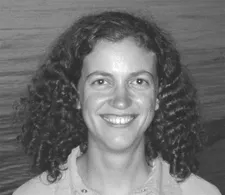Dr. Helene Muller-Landau '95

Assistant Professor
Dept. of Ecology, Evolution, and Behavior
University of Minnesota
"My math major was definitely a big help in grad school and beyond, both for theoretical work I've done in ecology and evolution and for quantitative analyses of empirical data. I would highly recommend majoring in math (or at least taking lots of math courses) to anyone interested in going on to grad school in ecology.
And from Dr. Muller-Landau's website:
"I'm fascinated by the diversity of ways in which plant species make a living, the diversity of plant species that can coexist within the same area, and the diversity of plant communities around the globe. I'm particularly interested in tropical forests: which generally have very high species richness and wide variation in many plant traits, and exhibit intriguing similarities and differences in structure among sites. My research seeks to understand this diversity, its causes, and its consequences, through a combination of empirical and theoretical studies.
"One major focus of my research has been seed dispersal. I've analyzed interspecific and interannual differences in seed production and seed dispersal of tropical tree species, examined the relative importance of seed dispersal to seedling recruitment in tropical forests, used models to investigate the consequences of different seed dispersal strategies for community-level patterns in general, and conducted theoretical studies of seed dispersal evolution. Another area of interest is the Janzen-Connell hypothesis: the idea that specialized natural enemies depress success in areas of higher density of any one species, thus acting to maintain diversity. I'm pursuing theoretical studies of how this effect varies with characteristics of plants and their enemies, complementing empirical studies documenting the strength of the effect in different species and life stages. In the last year, I've also been working on explaining differences in forest structure among tropical sites, again using both theory and data.
"I believe that a better, more mechanistic understanding of plant communities is urgently needed in order for us to accurately predict long-term impacts of growing anthropogenic influences - especially in communities such as tropical forests that are dominated by long-lived organisms. I hope that my research will not only contribute to such a basic ecological understanding of plant communities, but also enhance our ability to assess and manage human influences on them.



